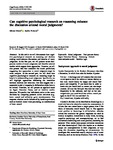Can cognitive psychological research on reasoning enhance the discussion around moral judgments?
| dc.contributor.author | Bialek, M | en |
| dc.contributor.author | Terbeck, S | en |
| dc.date.accessioned | 2018-02-14T14:10:26Z | |
| dc.date.available | 2018-02-14T14:10:26Z | |
| dc.date.issued | 2016-08 | en |
| dc.identifier.uri | http://hdl.handle.net/10026.1/10777 | |
| dc.description.abstract |
In this article we will demonstrate how cognitive psychological research on reasoning and decision making could enhance discussions and theories of moral judgments. In the first part, we will present recent dual-process models of moral judgments and describe selected studies which support these approaches. However, we will also present data that contradict the model predictions, suggesting that approaches to moral judgment might be more complex. In the second part, we will show how cognitive psychological research on reasoning might be helpful in understanding moral judgments. Specifically, we will highlight approaches addressing the interaction between intuition and reflection. Our data suggest that a sequential model of engaging in deliberation might have to be revised. Therefore, we will present an approach based on Signal Detection Theory and on intuitive conflict detection. We predict that individuals arrive at the moral decisions by comparing potential action outcomes (e.g., harm caused and utilitarian gain) simultaneously. The response criterion can be influenced by intuitive processes, such as heuristic moral value processing, or considerations of harm caused. | en |
| dc.format.extent | 329 - 335 | en |
| dc.language | eng | en |
| dc.language.iso | eng | en |
| dc.subject | Default interventionist model | en |
| dc.subject | Dual-process theory | en |
| dc.subject | Intuitive logic | en |
| dc.subject | Moral judgments | en |
| dc.subject | Reasoning | en |
| dc.subject | Signal Detection Theory | en |
| dc.subject | Cognition | en |
| dc.subject | Female | en |
| dc.subject | Humans | en |
| dc.subject | Judgment | en |
| dc.subject | Male | en |
| dc.subject | Models, Psychological | en |
| dc.subject | Morals | en |
| dc.subject | Signal Detection, Psychological | en |
| dc.subject | Thinking | en |
| dc.title | Can cognitive psychological research on reasoning enhance the discussion around moral judgments? | en |
| dc.type | Journal Article | |
| plymouth.author-url | https://www.ncbi.nlm.nih.gov/pubmed/27016146 | en |
| plymouth.issue | 3 | en |
| plymouth.volume | 17 | en |
| plymouth.publication-status | Published | en |
| plymouth.journal | Cogn Process | en |
| dc.identifier.doi | 10.1007/s10339-016-0760-y | en |
| plymouth.organisational-group | /Plymouth | |
| plymouth.organisational-group | /Plymouth/REF 2021 Researchers by UoA | |
| plymouth.organisational-group | /Plymouth/REF 2021 Researchers by UoA/UoA04 Psychology, Psychiatry and Neuroscience | |
| dc.publisher.place | Germany | en |
| dcterms.dateAccepted | 2016-03-10 | en |
| dc.identifier.eissn | 1612-4790 | en |
| dc.rights.embargoperiod | Not known | en |
| rioxxterms.versionofrecord | 10.1007/s10339-016-0760-y | en |
| rioxxterms.licenseref.uri | http://www.rioxx.net/licenses/all-rights-reserved | en |
| rioxxterms.licenseref.startdate | 2016-08 | en |
| rioxxterms.type | Journal Article/Review | en |


